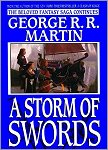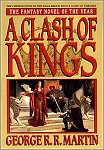Summary:
The Red Tent is a story of Dinah, the daughter of Jacob from the Bible. It's basically the tale of Jacob from the women's point of view, and then some. The writing is detailed and flows easily (reminds me of Harry Potter). I read it in two days. Be aware that this book doesn't follow the Biblical story exactly, and in some cases contradicted it. It is a story of women during Biblical times.
Details:
The author of this book is a Jewish journalist who has written many books on modern Judaic life. I was confident she didn't have the agenda of tearing down Judeo-Christian beliefs.
Quick summary of Jacob's tale from the Genesis: Jacob stole his twin brother Esau's birthright, ran away to a foreign land. He came to his uncle, Laban, and fell in love with his youngest daughter Rachel. He worked for Laban for 7 years in order to marry Rachel, but on the wedding day Laban tricked him and it turned out he married Leah, the eldest daughter. Jacob was mad, but Laban said it was tradition for the eldest sister to get married first. So then Jacob worked 7 more years, and married Rachel. Jacob then had many sons, and one daughter (Dinah). One of Jacob's sons is Joseph of the technicolor dreamcoat, who got persecuted by his brothers (for his pride in dream-reading), got sold into slavery, and ended up years later as a vizier in Egypt because of his wisdom and dream-reading abilities. Joseph, now a powerful man, in the end forgave his brothers for their crimes against him. I glosses over some parts. Oh yeah, Dinah was raped by a prince of the city of Shechem, and the man wanted to marry Dinah. Jacob told them that the city must convert to the God of his fathers, and therefore every man must get circumsized. After all the men got circumsized in the city, while they were in pain, Dinah's brothers Levi and Shechem entered the city and slayed everyone. Whew!
I liked how the book started. Women whisper their tales to their daughters, not their sons. Dinah was the only daughter in a family of four mothers, and so she heard all of their tales. Much of this took place in The Red Tent, the one tent in the camp where men did not enter. The Red Tent was where women went to for their monthly visitor, as well as childbirths.
Part one of the book is all about the generation previous to her, and it recalls a mostly Biblical account of what happened to Jacob. The characters were well-developed and the stories were detailed and plausible. Some things were changed from the Biblical story; the author took advantage of dramatic license (e.g. Jacob worked less than 7 years for the two women). Part one concluded with Dinah's birth.
Part 2 was about Dinah's life, from her childhood until her experience with the prince from Shechem. It follows the Biblical story largely, but departs from it in surprising ways. In this section the idea of a feminine goddess gets brought up - a heathen religion from Laban's family before Jacob came into the picture (Rachel stole those idols when they left Laban). Some of the contradictions she had with the Biblical story implied that the Biblical story was just a story from another point of view, as opposed to being the actual happenings.
Example: In the Bible, Jacob and his family fled from Laban. In The Red Tent, the family was actually waiting around for Laban to properly say goodbye, but they were in a rush so they couldn't keep waiting forever, and Jacob lamented that he hated running away as if he was a thief. Get the gist?
There are examples of this sprinkled throughout the book. Frankly, some of it bothered me.
After her experience with the prince of Shechem, the book goes further, making up a tale of Dinah (unBiblical, but not contradictory). It describes the rest of her life. The book ended well; it ended where it needed to end.
The author has a way of writing that is clear and descriptive. It is not presumptious, but it does use some words that I wanted to look up (which I am thankful for). I read it effortlessly.
I recommend this book, but with caveats about Biblical contradictions that I noted above. If I viewed this purely as a book of historical fiction, I'd recommend it wholeheartedly.




